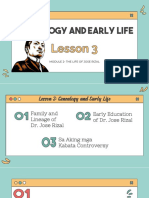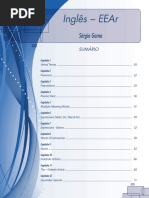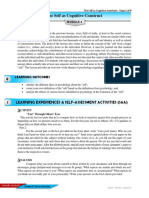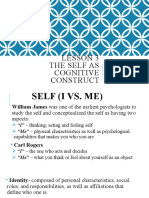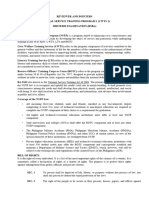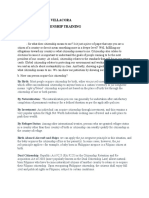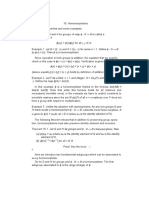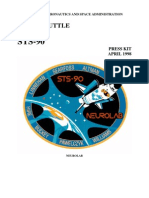Lts 1 Module 3 Module 3
Lts 1 Module 3 Module 3
Uploaded by
Erica CanonCopyright:
Available Formats
Lts 1 Module 3 Module 3
Lts 1 Module 3 Module 3
Uploaded by
Erica CanonCopyright
Available Formats
Share this document
Read this document in other languages
Did you find this document useful?
Is this content inappropriate?
Copyright:
Available Formats
Lts 1 Module 3 Module 3
Lts 1 Module 3 Module 3
Uploaded by
Erica CanonCopyright:
Available Formats
lOMoARcPSD|9681042
LTS 1-Module 3 - Module 3
Literacy Training Service 1 (Palawan State University)
StuDocu is not sponsored or endorsed by any college or university
Downloaded by Erica Canon (ericacanon53@yahoo.com)
lOMoARcPSD|9681042
National Service
Training Program
Literacy Training Service 1
Part II
UNIT APPLICATION OF GOOD
CITIZENSHIP IN DAILY LIFE
Prepared by:
JAPHETH C. AURELLO
Instructor
202 Part 2 – Unit 2: Application of Good Citizenship in Daily Life
Downloaded by Erica Canon (ericacanon53@yahoo.com)
1
lOMoARcPSD|9681042
Doc. Ref. No.: NSTP 1 - LTS 1
PALAWAN STATE UNIVERSITY Effectivity Date: Sep. 1, 2020
North External Campuses Revision No.: 001
Coron Campus Total Page No.: 14
Instructor: Japheth C. Aurello
Student Name: Program BSEd-English Block: None
:
Application of Good
Citizenship in Daily Life
Student Signature: Date Returned:
Vision Mission
An Internationally recognized university that provides relevant and Palawan State University is committed to upgrade people’s quality of life by
innovative education and research for lifelong learning and sustainable providing education opportunities through excellent instruction, research and
development innovation, extension, production services, and transnational collaboration
Part 2 – Unit 2: Application of Good Citizenship in Daily Life 2
Downloaded by Erica Canon (ericacanon53@yahoo.com)
lOMoARcPSD|9681042
Part
2 Unit 2: Application of Good Citizen in Daily Life
Learning Objectives:
At the end of this module, you will be able to:
1. Determine the different factors determining citizenship.
2. Describe how they fulfill their responsibilities as Filipino citizens.
3. Apply the importance of being a good citizen in today’s generation.
Let’s Examine:
Using this respect note, make your own creative “Respect Note” and copy the question
on the note, then answer it.
Part 2 – Unit 2: Application of Good Citizenship in Daily Life 3
Downloaded by Erica Canon (ericacanon53@yahoo.com)
lOMoARcPSD|9681042
What is Citizenship?
Citizenship is a term denoting membership of a citizen in a political society? Which
membership implies, reciprocally, a duty of allegiance on the part of the member and duty of
protection on the part of the State. (De Leon). Citizenship denotes the link between a person and a
state or an association of states. It is normally synonymous with the term nationality although the
latter term may also refer to ethnic connotations. Possession of citizenship is normally associated
with the right to work and live in a country and to participate in political life. A person who does not
have citizenship in any state is said to be stateless. Nationality is often used as a synonym for
citizenship- notably in international law- although the term is sometimes as denoting a person’s
membership of a nation.
What is Good Citizenship?
Good citizenship means “huwarang mamamayan” in Filipino. Good citizenship is living by
the values of cooperation, patriotism, hard work, respect for others, respect for the law and
government, truth, freedom, love equality and peace. Good citizens are law-abiding, helpful to others
in their community, and have good personal traits, such as patience, honesty, and understanding
toward other people.
Rights with Obligations
Citizen should realize that for every right there must be a corresponding duty. It is true, they
have rights of which is they cannot be deprived of, but they have also duties which they must not
neglect. If the people are aware not only of their rights but also of their obligations, there will be les
misunderstanding and less conflict in the society. One of the reasons for the turmoil and ferment in
many countries is the attitude of demanding one’s right under the law and yet forgetful of one’s duties
as a citizen.
Rights become fully available for enjoyment only when all the citizens, without exception,
comply loyalty with all their obligations. The rights to life, liberty and property, for instance, are but
partially for enjoyment so long as there are members of the political community who are deficient in
that necessary compliance.
What are Factors determining citizenship?
The modem sense of citizenship is usually based on one or more of these factors:
Parents are citizens- If a person has no or both parents who are citizens of a given state,
then the person is normally a citizen of that state as well. Citizenship granted in this fashion is
referred to by the Latin phrase jus sanguinis meaning “right of blood” and means that
citizenship is granted based on ancestry or ethnicity, and is related to the concept of a nation
state common in Europe. A person could be born outside of the physical territory of the
country, but if his or her parents are citizens, then the child is z citizen as well. States normally
limit the right to citizenship by descent to a certain number of generations born outside the
state. This form of citizenship is common in civil law countries.
Born within a country- Many people are presumed to be citizen of a state if they were born
within its territory. Citizenship granted in this fashion is referred to by the Latin phrase jus soli
meaning “right of soil”. This form of citizenship is common in common law countries and
originated in England where those who were born within the realm were subjects of the king.
Part 2 – Unit 2: Application of Good Citizenship in Daily Life 4
Downloaded by Erica Canon (ericacanon53@yahoo.com)
lOMoARcPSD|9681042
Marriage to a citizen- Citizenship can also be obtained by marrying a citizen, which is termed
jure matrimoni.
Naturalization- States normally grant citizenship to people who have immigrated to that state
and have resided there for the given number of years. Sometimes aspiring citizenship may
have to pass a test, swear allegiance to their new state and renounce their prior citizenship.
Philippine Citizenship
Who are Philippine citizens under the present Constitution?
The 1987 Constitution, Article IV, Section 1 provides:
Section 1: The following are citizens of the Philippines:
Those who are citizens of the Philippines at the time of the adoption of this Constitution;
Those whose father or mothers are citizens of the Philippines
Those born before January 17, 1937, of a Filipino mother, who elect Philippine citizenship
upon reaching the age of majority; and
Those who are naturalized in accordance of law.
What is a natural-born Filipino citizen?
Natural-born citizen are those who are citizens from birth without having to perform any act to
acquire or perfect their Philippine citizenship. Those who elect Philippine Citizenship in
accordance with the Constitution shall be deemed natural-born citizens.
What are the modes of acquiring citizenship?
a. There are two (2) generally recognized modes of acquiring Philippine citizenship, namely:
1. by birth; and
A. Jus soli (right of soil) which is the legal principle that a person’s nationality at birth
(i.e., the territory of a given state).
B. Jus sanguinis (right of blood) which is the legal principle that, at birth, an individual
acquires the nationality of his/her natural parent/s. The Philippines adheres to this principle.
2. by naturalization which is the judicial act of adopting a foreigner and clothing him with the
privileges of a native-born citizen. It implies the renunciation towards a new body politic. (2
Am.Jur.561, par.188)
What are the bases of acquiring citizenship by birth, namely:
There are 3 bases for acquiring citizenship.
1. Jus soli (right of soil) which is the legal principle that a person’s nationality at birth (i.e., the
territory of a given state)
Part 2 – Unit 2: Application of Good Citizenship in Daily Life 5
Downloaded by Erica Canon (ericacanon53@yahoo.com)
lOMoARcPSD|9681042
2.Jus sanguinis (right of blood) which is the legal principle that, at birth, an individual acquires
that nationality of his/her natural parent/s.
3.Naturalization- which is the judicial act of adopting a foreigner and clothing him with the
privileges of a native-born-citizen. It implies the renunciation of a former nationality and the fact of
entrance into a similar relation towards a new body politic.
Who may qualify as Philippines citizen by naturalization under the revised Naturalization Act?
Under Section 2 of the Revised Naturalization Law applicant must possess the ff. qualification.
He must not be less than twenty-one- years of age the day of the hearing of the petition.
He must have resided in the Philippines for a continuous period of not less than ten years.
He must be a good moral character and believes in the principles underlying he Philippine
Constitution, and must have conducted himself in a proper and irreproachable manner
during the entire period of his residence in the Philippines in his relation with the constituted
government as well as with the community in which he is living;
He must own real state in the Philippines worth not less than five thousand pesos,
Philippine currency, or must have some known lucrative trade, profession, or lawful
occupation.
He must be able to speak English or write English or Spanish or anyone of the principal
languages.
He must have enrolled his minor children of school age in any of the principal languages.
He must have enrolled his minor children of school recognized by the Bureau of Public
Schools of the Philippines where Philippine history, government and civics are taught or
prescribed as a part of the school curriculum, during the entire period of the residence in
the Philippines required of him prior to the hearing of the petition for naturalization as
Philippine citizen.
Who are not qualified to apply for naturalization of the Revised Naturalization
Under section of 4 of the Revised Naturalization Law, the following persons cannot qualify for
Philippine citizenship:
Persons opposed to organized government or affiliated with any association or group of
persons who uphold and teach doctrines opposing all organized governments.
Persons defending or teaching the necessity or propriety of violence, personal assault,
or assassination for the success and predominance of their ideas;
Polygamists or believers in the practice of polygamy;
Persons convicted of crimes involving moral turpitude;
Persons suffering from mental alienation or incurable contagious diseases;
Persons who during the period of their stay in the Philippines, have not mingled socially
with the Filipinos, or who have not evinced a sincere desire to learn and embrace the
customs, traditions, and ideals of the Filipinos;
Citizens or subjects of a nations with whom the Philippines is at war;
Citizens or subject of a foreign country other than the United States, whose laws do not
grant Filipinos the right to become naturalized citizens or subject thereof.
Part 2 – Unit 2: Application of Good Citizenship in Daily Life 6
Downloaded by Erica Canon (ericacanon53@yahoo.com)
lOMoARcPSD|9681042
Let’s Try:
Write an essay/poem/song/infographics, etc. on how you fulfill your responsibilities as a Filipino
citizen.
Information Bits:
Did you know that there are 3 kinds of Citizenship?
a. Political Citizenship- it means showing respect for the law and government. One can be a good
political citizen by carrying out duties such as voting, paying taxes and obeying traffic.
b. environment citizenship- It involves caring for the environment. Practice environment citizenship by
doing things like conserving water, using fuel wisely, planting a tree and putting garbage in the
disposal.
c. socio-economic citizenship- It is about caring for the community and supporting the economy. A
person can show socio-economic citizenship by buying products made in the Philippines, engaging in
legitimate livelihood programs, and volunteering in church groups, health centers, and schools.
Information Buzz:
To further understand the lesson, please click the link below:
Alex Lacson’s 12 Little Things Every Filipino Can Do to Help Our Country. (March 2012). Available at
https://www.youtube.com/watch?v=Cxi_67YuebU
Good Citizen. Available at https://olc.worldbank.org/content/philippines-what-it-takes-be-good-citizen
Let’s Measure:
Write a reflection paper about the importance of being a good citizen in today’s generation.
Guide Question:
What makes a good citizen?
Part 2 – Unit 2: Application of Good Citizenship in Daily Life 7
Downloaded by Erica Canon (ericacanon53@yahoo.com)
lOMoARcPSD|9681042
Key to answers:
Rubric
Depth
reflecti
Requir
compo
Quality
Informa
Structu
Organi
Part 2 – Unit 2: Application of Good Citizenship in Daily Life 8
Downloaded by Erica Canon (ericacanon53@yahoo.com)
lOMoARcPSD|9681042
Rubric for Video Presentation
Criteria/ 4-Excellent 3-Good 2-Fair 1-Needs
Ratings Improvement
Content It covers all the It includes basic It includes The content
topics in depth with knowledge about essential includes minor
details and the topic. The information details and it has
examples. content seems to be about the topic, several mistakes
good. but it has some in the facts.
correction
Originality The product shows The product shows The uses of The use of ideas
great originality. The certain originality. It ideas from other from other people
ideas are creative shows the use of people (quoting without quoting
and witty. new ideas and of them) but there them.
shrewdness. is a little
evidence of
original ideas.
Use of There are no any There are few There are four More than four
language mistakes in spelling mistakes in spelling mistake in mistakes in
or grammar and and diction use. spelling and spelling and
diction. diction use. diction.
Videography- The overall quality Most of the quality Needs more Needs more
Clarity of the video effects, of the video effects effort in the improvement in
design and the and the focus were quality of video the quality of
focus were good. effects, design video effects,
excellent. and focus. design and focus.
Part 2 – Unit 2: Application of Good Citizenship in Daily Life 9
Downloaded by Erica Canon (ericacanon53@yahoo.com)
lOMoARcPSD|9681042
Part 2 – Unit 2: Application of Good Citizenship in Daily Life 10
Downloaded by Erica Canon (ericacanon53@yahoo.com)
lOMoARcPSD|9681042
Part 2 – Unit 2: Application of Good Citizenship in Daily Life 11
Downloaded by Erica Canon (ericacanon53@yahoo.com)
lOMoARcPSD|9681042
Part 2 – Unit 2: Application of Good Citizenship in Daily Life 12
Downloaded by Erica Canon (ericacanon53@yahoo.com)
lOMoARcPSD|9681042
Part 2 – Unit 2: Application of Good Citizenship in Daily Life 13
Downloaded by Erica Canon (ericacanon53@yahoo.com)
lOMoARcPSD|9681042
References:
Labuguen, F.C., Ramos, A.I., Placer, R.B., Vidal, C.J.E., Moralde, R.P.E., &
Rendorio, E.V. (2012). Understanding the National Service Training Program.
Malabon City, Philippines: Mutya Publishing House.
Part 2 – Unit 2: Application of Good Citizenship in Daily Life 14
Downloaded by Erica Canon (ericacanon53@yahoo.com)
You might also like
- UTS - The Physical SelfDocument24 pagesUTS - The Physical SelfRhodhel BillonesNo ratings yet
- Groups, Rings and Fields: "The Common Algebraic Structures"Document56 pagesGroups, Rings and Fields: "The Common Algebraic Structures"Erica CanonNo ratings yet
- Chit Funds CalculatorDocument8 pagesChit Funds CalculatorJay Dev75% (4)
- Lesson 3 Genealogy and Early Life of Dr. Jose Rizal PPT VersionDocument38 pagesLesson 3 Genealogy and Early Life of Dr. Jose Rizal PPT VersionErica G. EganaNo ratings yet
- Chapter 6 Part 1Document30 pagesChapter 6 Part 1John Vincent100% (1)
- UTS Module 4-6Document16 pagesUTS Module 4-6mikaela thereseNo ratings yet
- Liebherr Engine Service ManualDocument2 pagesLiebherr Engine Service Manualpurnima50% (6)
- Novo Gamex PDFDocument96 pagesNovo Gamex PDFDiego JoliverNo ratings yet
- Types of Threats in Human & Ecological SecurityDocument15 pagesTypes of Threats in Human & Ecological SecurityEmmanuelle Kate Magpayo - 1A100% (1)
- Eastern and Western Thought - Lesson 4Document14 pagesEastern and Western Thought - Lesson 4Mary Grace Alipayo SambajonNo ratings yet
- Pathfit 2 Lesson 1Document16 pagesPathfit 2 Lesson 1Steffany Anne PobladorNo ratings yet
- M4 Topic 1 - Basic Areas of Ethical StudyDocument32 pagesM4 Topic 1 - Basic Areas of Ethical StudyLynet Claire GuiquingNo ratings yet
- The Self As Cognitive Construct: Learning Experiences & Self-Assessment Activities (Saa)Document9 pagesThe Self As Cognitive Construct: Learning Experiences & Self-Assessment Activities (Saa)Jeremias De la CruzNo ratings yet
- Reflection PaperDocument2 pagesReflection PaperJewelle Vincent Dags AtienzaNo ratings yet
- Lesson 6 INTRODUCTION TO CONTEMPORARY PHILOSOPHICAL ISSUES ReportDocument27 pagesLesson 6 INTRODUCTION TO CONTEMPORARY PHILOSOPHICAL ISSUES ReportClarice Garduce50% (2)
- UTS Module 1-E Output Western and Eastern ThoughtDocument3 pagesUTS Module 1-E Output Western and Eastern ThoughtBlethy April PalaoNo ratings yet
- M9-A Political SelfDocument41 pagesM9-A Political SelfEsther Joy HugoNo ratings yet
- Lesson 3 The Self As Cognitive Construct: Ms. Bianca NuestroDocument10 pagesLesson 3 The Self As Cognitive Construct: Ms. Bianca NuestroKian GaboroNo ratings yet
- Lesson 8 - The Political SelfDocument19 pagesLesson 8 - The Political SelfJhoy DubloisNo ratings yet
- Psychology - The Self As Cognitive ConstructionDocument13 pagesPsychology - The Self As Cognitive ConstructionRalph Torres100% (1)
- Because of What We AreDocument2 pagesBecause of What We AreBianca ApostolNo ratings yet
- Reading Assignment - MMW - JHONDAVESURBANO - BSED-SCIENCE 1ADocument3 pagesReading Assignment - MMW - JHONDAVESURBANO - BSED-SCIENCE 1AJhon Dave SurbanoNo ratings yet
- Understanding The Self: Chapter 1 Lesson 4Document26 pagesUnderstanding The Self: Chapter 1 Lesson 4Lemon100% (1)
- Lecture4 NSTPDocument33 pagesLecture4 NSTPitskimheeeyNo ratings yet
- NSTP Module 2 Lesson 1Document13 pagesNSTP Module 2 Lesson 1Andrea WaganNo ratings yet
- NSTP-chapter 12Document3 pagesNSTP-chapter 12Mrendy Santos100% (1)
- I Am Legazpi-Thomasian!: FaithDocument19 pagesI Am Legazpi-Thomasian!: FaithWilliam Soneja Calapini33% (3)
- Understanding The Self Ge 1 Module AscDocument143 pagesUnderstanding The Self Ge 1 Module AscErica Elas100% (1)
- Lesson 1 History of Political Parties in The PhilippinesDocument9 pagesLesson 1 History of Political Parties in The PhilippinesMeng NayttkuvaNo ratings yet
- Kartilya NG KatipunanDocument10 pagesKartilya NG Katipunanoretnallniwla100% (1)
- GE 2 Readings in Philippine History SyllabusDocument25 pagesGE 2 Readings in Philippine History SyllabusMargarita Doria100% (1)
- Chapter 1. Concept and Nature of SelfDocument23 pagesChapter 1. Concept and Nature of SelfJaya CajalneNo ratings yet
- ACTIVITY 3 - NSTP1 - Answered VersionDocument4 pagesACTIVITY 3 - NSTP1 - Answered VersionLamour ManlapazNo ratings yet
- Course Pack - Ged 5Document106 pagesCourse Pack - Ged 5Nerissa Joy Manon-ogNo ratings yet
- Primary - Not Made or Coming From Something Else, Original Firsthand - Coming Directly From The Original SourceDocument2 pagesPrimary - Not Made or Coming From Something Else, Original Firsthand - Coming Directly From The Original SourceKarenjoy Rosal DeveraNo ratings yet
- Understanding The Self Chapter 2 Lesson 1Document10 pagesUnderstanding The Self Chapter 2 Lesson 1MASHNo ratings yet
- Understanding The Self: Course Code: UNDSELFDocument17 pagesUnderstanding The Self: Course Code: UNDSELFDianna Rose DiazNo ratings yet
- To Buy or Not To Buy? That Is The Question!: Learning Experiences & Self-Assessment Activities (Saa)Document6 pagesTo Buy or Not To Buy? That Is The Question!: Learning Experiences & Self-Assessment Activities (Saa)Jeremias De la CruzNo ratings yet
- Unpacking The Self-Physical SelfDocument3 pagesUnpacking The Self-Physical SelfAlyssa Crizel CalotesNo ratings yet
- Readings in Philippine History: Course TitleDocument27 pagesReadings in Philippine History: Course TitleArianne Rose Fangon100% (1)
- NSTP and The Philippine Constitution - ReportDocument12 pagesNSTP and The Philippine Constitution - ReportCaryl Louise LozanoNo ratings yet
- Module in Cwts 5Document11 pagesModule in Cwts 5Keara Jermain RellenteNo ratings yet
- Movement Competency Training Module No. 5Document3 pagesMovement Competency Training Module No. 5Jhon Keneth NamiasNo ratings yet
- The Spiritual Self UTSDocument32 pagesThe Spiritual Self UTSJulia Ferolino100% (3)
- Module 3. Unfolding The Social Self - EditedDocument27 pagesModule 3. Unfolding The Social Self - EditedAhmad Zaki Attar50% (2)
- CHAPTER 2 Lesson 3 - Supernaturals - Believe It or NotDocument15 pagesCHAPTER 2 Lesson 3 - Supernaturals - Believe It or NotGiscele Sierra100% (1)
- NSTP Cwts 1 Modules For First SemesterDocument51 pagesNSTP Cwts 1 Modules For First SemesterJustine Camposo100% (1)
- LESSON 2 History and The HistorianDocument10 pagesLESSON 2 History and The HistorianCyLyn Pets0% (1)
- 12 Dream Big and Make It HappenDocument11 pages12 Dream Big and Make It HappenJesslene Roque Mojica100% (1)
- Module 2 For Understanding The SelfDocument8 pagesModule 2 For Understanding The SelfMa. Thea Diane Billones100% (1)
- GEC E Notes 1 General EthicsDocument6 pagesGEC E Notes 1 General EthicsDonna Melgar100% (1)
- Reviewer and Pointers - NSTP 1Document13 pagesReviewer and Pointers - NSTP 1ized.coffee0123No ratings yet
- Physical Self: Chapter Ii: Unpacking The Self A. The Physical SelfDocument35 pagesPhysical Self: Chapter Ii: Unpacking The Self A. The Physical SelfCherry Mae CabuangNo ratings yet
- UTS (Mead & Vygotsky)Document7 pagesUTS (Mead & Vygotsky)Azy FranciscoNo ratings yet
- History Was Derived From The Greek Word "Historia" Which Means "Knowledge Acquired Through Inquiry or Investigation"Document3 pagesHistory Was Derived From The Greek Word "Historia" Which Means "Knowledge Acquired Through Inquiry or Investigation"kernelkobieNo ratings yet
- GE 102 - Reading in The Philippine HistoryDocument20 pagesGE 102 - Reading in The Philippine HistoryLiezel Pable DajuyaNo ratings yet
- Ethics - Module 3Document20 pagesEthics - Module 3Dale CalicaNo ratings yet
- Social, Environmental, and Other Life Factors (S.E.L.F) : Nature vs. NurtureDocument3 pagesSocial, Environmental, and Other Life Factors (S.E.L.F) : Nature vs. NurtureKryslane Ariz IINo ratings yet
- NSTP Learning Exercises 2Document16 pagesNSTP Learning Exercises 2Kay AbawagNo ratings yet
- Lesson 3 Module 3: Values Development For Citizenship TrainingDocument5 pagesLesson 3 Module 3: Values Development For Citizenship TrainingAnamae Detaro DarucaNo ratings yet
- Template - GE3 Module 1-FDOMEDocument21 pagesTemplate - GE3 Module 1-FDOMEJoshua RamosNo ratings yet
- CWTS Chapter 6 10 ModuleDocument28 pagesCWTS Chapter 6 10 ModuleLianna Francesca JalbuenaNo ratings yet
- Pol 102 Odl MaterialDocument56 pagesPol 102 Odl MaterialAwotunde TofunmiNo ratings yet
- Marc Johanna L. Villacora Activity 2.1 Citizenship TrainingDocument6 pagesMarc Johanna L. Villacora Activity 2.1 Citizenship TrainingDhision VillacoraNo ratings yet
- Set Theory: Bicol Unviersity Graduate School Daraga, AlbayDocument59 pagesSet Theory: Bicol Unviersity Graduate School Daraga, AlbayErica CanonNo ratings yet
- Set TheorylectDocument77 pagesSet TheorylectErica CanonNo ratings yet
- Cyclic GroupDocument38 pagesCyclic GroupErica CanonNo ratings yet
- Permutation Group: Jocelyn F. Goyena Bicol UniversityDocument46 pagesPermutation Group: Jocelyn F. Goyena Bicol UniversityErica CanonNo ratings yet
- Homo Morphis M NewDocument24 pagesHomo Morphis M NewErica CanonNo ratings yet
- Permutation Groups2020Document22 pagesPermutation Groups2020Erica CanonNo ratings yet
- Rings of PolynomialsDocument38 pagesRings of PolynomialsErica CanonNo ratings yet
- Section 13 Homomorphisms: HomomorphismDocument8 pagesSection 13 Homomorphisms: HomomorphismErica CanonNo ratings yet
- HomomorphismlectureDocument4 pagesHomomorphismlectureErica CanonNo ratings yet
- Sophia Therese Canon Grade 7-Ste 2 Science 7: Pure SubstanDocument3 pagesSophia Therese Canon Grade 7-Ste 2 Science 7: Pure SubstanErica CanonNo ratings yet
- Cyclic and CosetsDocument76 pagesCyclic and CosetsErica CanonNo ratings yet
- Parent's Orientation AttendanceDocument1 pageParent's Orientation AttendanceErica CanonNo ratings yet
- Group Properties AND Group Isomorphism: TheimportanceofgrouptheoryDocument29 pagesGroup Properties AND Group Isomorphism: TheimportanceofgrouptheoryErica CanonNo ratings yet
- Q1 Quiz No. 2Document2 pagesQ1 Quiz No. 2Erica CanonNo ratings yet
- Long Happy Birthday Prayers For My Boss: Have A Blessed Birthday, SirDocument4 pagesLong Happy Birthday Prayers For My Boss: Have A Blessed Birthday, SirErica Canon100% (1)
- Adoption of The Basic-Education Learning Continuity Plan For School Year 2020-2021 in Light of COVID-19 Public Health EmergencyDocument74 pagesAdoption of The Basic-Education Learning Continuity Plan For School Year 2020-2021 in Light of COVID-19 Public Health EmergencyErica CanonNo ratings yet
- Integrated Performance Task Grade 8Document12 pagesIntegrated Performance Task Grade 8Erica Canon0% (1)
- Integrative Assessment Grade 7Document12 pagesIntegrative Assessment Grade 7Erica CanonNo ratings yet
- Rethinking Distance Education in Covid-19 Pandemic: Perspectives On Education Equity in The 'New Normal'Document24 pagesRethinking Distance Education in Covid-19 Pandemic: Perspectives On Education Equity in The 'New Normal'Erica CanonNo ratings yet
- Contributor's Background Contribution/ Artwork Meaning or The Function of The ContributionDocument1 pageContributor's Background Contribution/ Artwork Meaning or The Function of The ContributionErica CanonNo ratings yet
- Challenges of Teachers in COVID-19Document11 pagesChallenges of Teachers in COVID-19Erica Canon100% (2)
- Integrative Assessment Grade 10Document13 pagesIntegrative Assessment Grade 10Erica CanonNo ratings yet
- Integrative Performance Task-Gen MathDocument2 pagesIntegrative Performance Task-Gen MathErica Canon100% (1)
- Immersion Telephone ConversationDocument5 pagesImmersion Telephone ConversationJerick Gabriel DaconesNo ratings yet
- Decisional Balance WorksheetDocument1 pageDecisional Balance Worksheetapi-302132755No ratings yet
- 236 - Aurora Therater Shooting Court Documents Blows Inside Job Conspiracy Wide OpenDocument2 pages236 - Aurora Therater Shooting Court Documents Blows Inside Job Conspiracy Wide OpenDavid E RobinsonNo ratings yet
- L3 ProbabilityDocument22 pagesL3 ProbabilitySidarthNo ratings yet
- Beza Derb Business Policy and Strategic Management Individual AssignmentDocument12 pagesBeza Derb Business Policy and Strategic Management Individual Assignmentdave getuNo ratings yet
- History of Yoga SportsDocument9 pagesHistory of Yoga SportsmilindNo ratings yet
- Annai Medical CollegeDocument32 pagesAnnai Medical CollegeRajesh0% (1)
- Fairy TalesDocument28 pagesFairy Talesapi-182933137No ratings yet
- GE Case StudyDocument27 pagesGE Case StudyCody LeeNo ratings yet
- Ventriloquism For DummiesDocument4 pagesVentriloquism For DummiesAri Syuhada Putra0% (1)
- Edid 6512 Updated Timeline - Clarke RDocument1 pageEdid 6512 Updated Timeline - Clarke Rapi-528988079No ratings yet
- Indian Classical Musicand AayurvedaDocument12 pagesIndian Classical Musicand AayurvedaPankaj SharmaNo ratings yet
- Maxicare Vs ContrerasDocument2 pagesMaxicare Vs ContrerasRon AceroNo ratings yet
- STS-90 Press KitDocument44 pagesSTS-90 Press KitBob AndrepontNo ratings yet
- Activity 1 (Hist101) - BasilioDocument3 pagesActivity 1 (Hist101) - BasilioLexydail BasilioNo ratings yet
- Notice On Revsied Vacancy - Selection of RRB - Rly - Posts - 21!09!18Document45 pagesNotice On Revsied Vacancy - Selection of RRB - Rly - Posts - 21!09!18ankita sharmaNo ratings yet
- PDFDocument100 pagesPDFaditya kumawatNo ratings yet
- Labreportnew - 2024-11-22T145232.153Document4 pagesLabreportnew - 2024-11-22T145232.153wa6424312No ratings yet
- Entry 6 - Chanda Leigh AdeogbaDocument1 pageEntry 6 - Chanda Leigh AdeogbaOnPointRadioNo ratings yet
- EmmyDocument3 pagesEmmyimmamNo ratings yet
- Thorne Mediclear Detox BookletDocument28 pagesThorne Mediclear Detox BookletEnlightened ChickNo ratings yet
- We Are Intechopen, The World'S Leading Publisher of Open Access Books Built by Scientists, For ScientistsDocument13 pagesWe Are Intechopen, The World'S Leading Publisher of Open Access Books Built by Scientists, For ScientistsoerezrechelllynNo ratings yet
- GENG 111 - Lecture 02 - FreeHand SketchingDocument32 pagesGENG 111 - Lecture 02 - FreeHand SketchingNaeem NasserNo ratings yet
- Effectiveness of Training Programs of The Construction Sector in The Kingdom of BahrainDocument6 pagesEffectiveness of Training Programs of The Construction Sector in The Kingdom of BahrainInternational Journal of Innovative Science and Research TechnologyNo ratings yet
- Nur One 65 CopiesDocument4 pagesNur One 65 CopiesOluwafemi AdeniyiNo ratings yet
- 1 - Updated - 665520333 Biology INVESTIGATORY PROJECT REPORT ON GENE THERAPYDocument4 pages1 - Updated - 665520333 Biology INVESTIGATORY PROJECT REPORT ON GENE THERAPYhemNo ratings yet
- CTKD Hand BookDocument36 pagesCTKD Hand BookNatanael CamargosNo ratings yet



